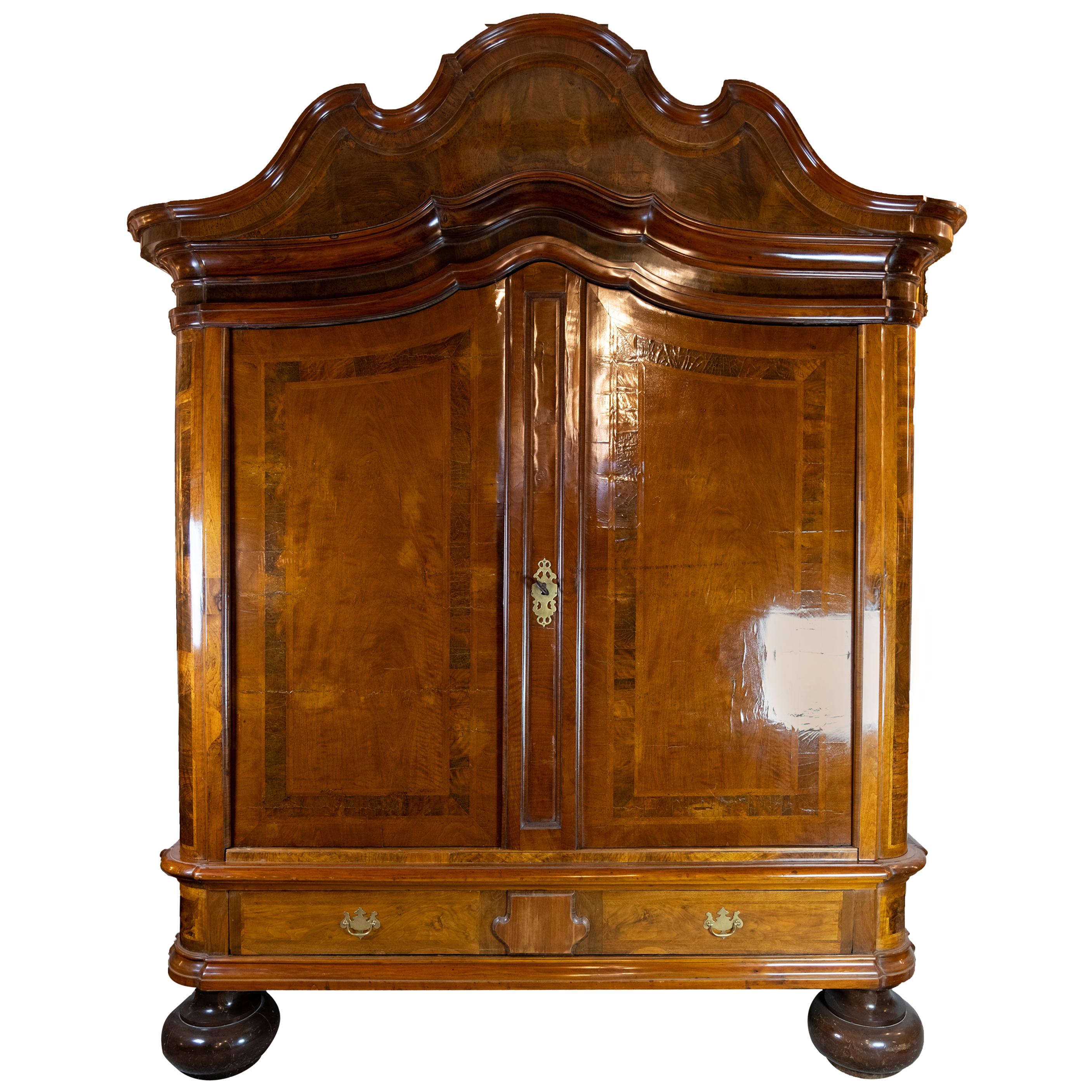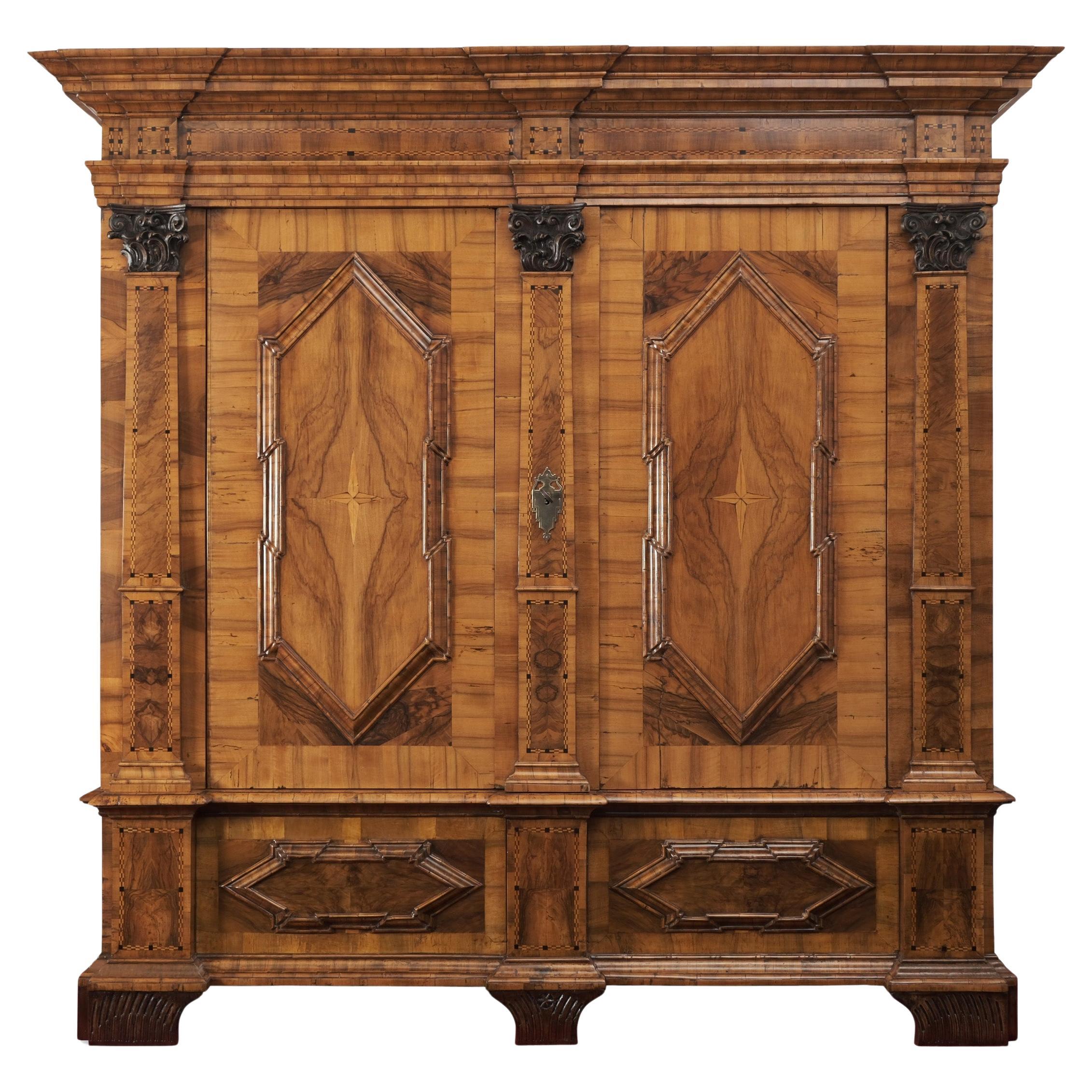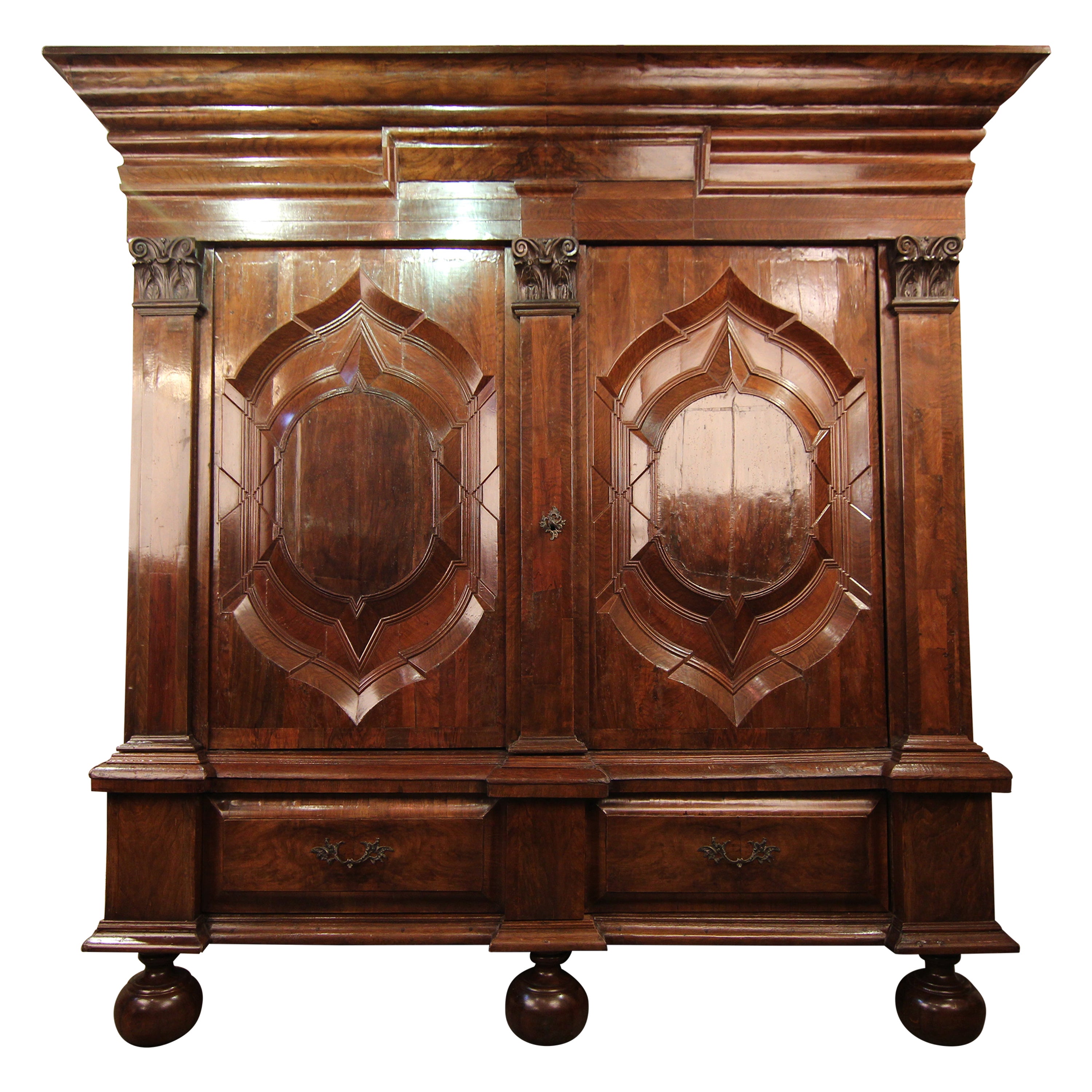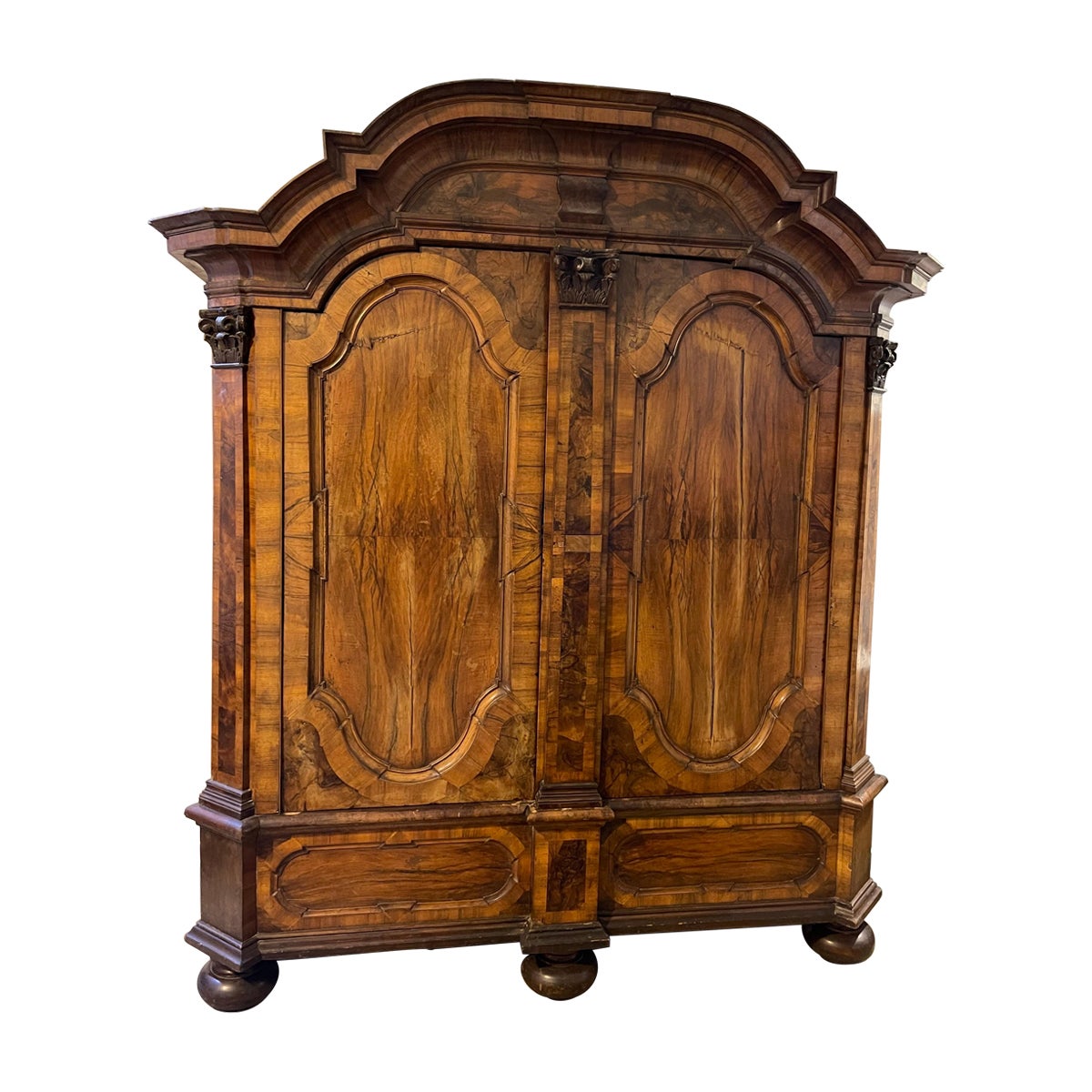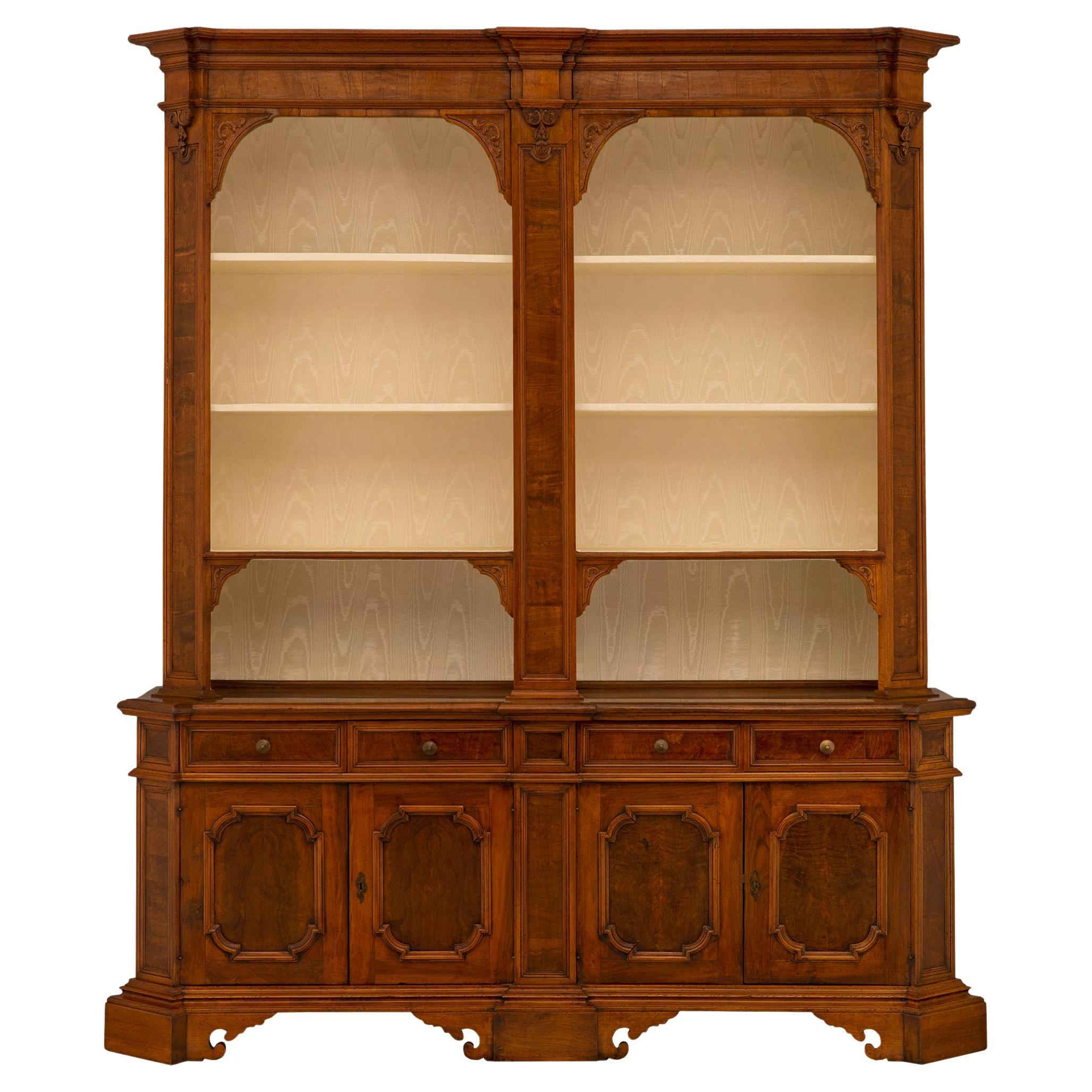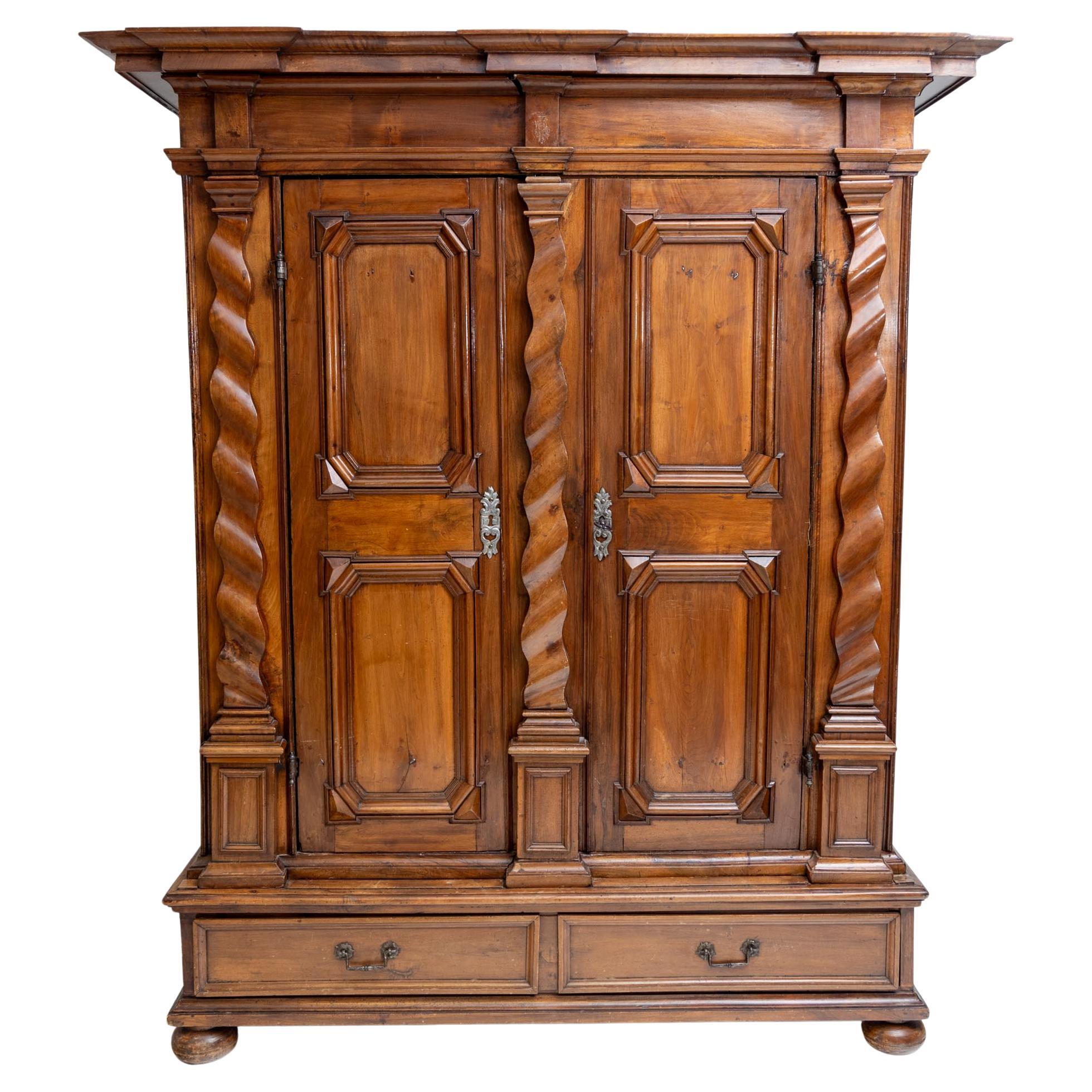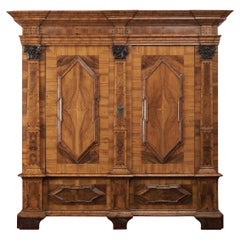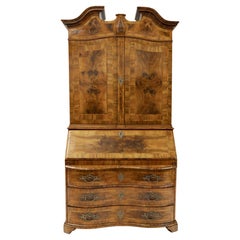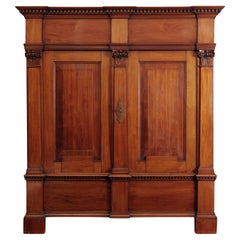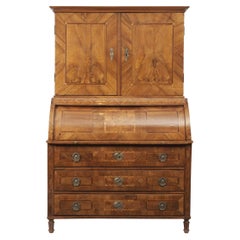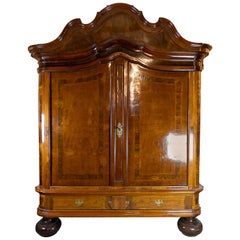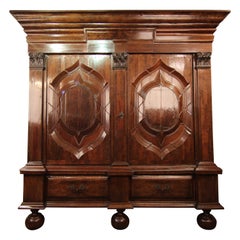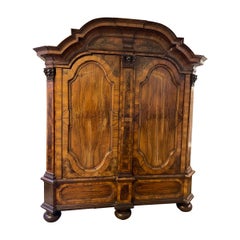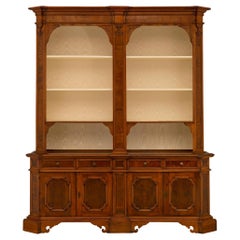Items Similar to Baroque Hall Cupboard Westphalia 1775/80 Walnut and Plum
Want more images or videos?
Request additional images or videos from the seller
1 of 7
Baroque Hall Cupboard Westphalia 1775/80 Walnut and Plum
$25,458.82
£19,105.39
€21,500
CA$35,660.76
A$39,132.35
CHF 20,261.15
MX$468,446.14
NOK 254,196.46
SEK 239,149.94
DKK 163,807.15
About the Item
Hall cabinet from the Budde Warendorf cabinetmakers, Westphalia, around 1770, walnut and plum veneered on oak, elaborate geometric veneer pattern, banded decoration, prismatic body with multi-stepped cornice, five pilasters with Corinthian capitals, 2 drawers in the plinth section, coffered doors with surrounding carved decorative band and floral motif, stepped pediment, crushed feet, can be dismantled, oak shelves, these added later
Height: 218 cm, width: 242 cm, depth: 86 cm
J.H. BUDDE (Johann Hermann Budde, Master 1774), Warendorf in Münsterland around 1780.
After his three-year apprenticeship and subsequent two-year period of service in Warendorf, Budde went on tour as a journeyman carpenter to Vienna, Aachen and Münster between 1762 and 1774, as the sources show. In 1774, he was awarded the title of master carpenter by the town of Warendorf and in the same year joined the Warendorf carpentry guild as guild master. During his time in Vienna, he worked as a journeyman carpenter for various masters until 1765. The design for his characteristic five-pillar cabinet dates from this time. After his return, he continued his apprenticeship with Master Schester in Münster. There is evidence of 10 pieces of furniture from his work. In most cases, the supporting wood is oak, veneered with walnut, burl ash and plum band inlays. The special feature of his closets is the number of five pilasters on the pilaster strips, which divide the wardrobe vertically and exceed the usual number of three columns. The slanted pilasters lead the side walls over to the wall and are purely decorative.
The design for this type of furniture by the master shows the outline of the cabinet, which served as a model for a series of his cabinets. He based the motif of the volutes of the Corinthian capitals of the pilasters decorated with fittings on a model from the Academy of Fine Arts in Vienna from 1762. Characteristic of Johann Hermann Budde's workshop are the shapes of the banding, which frame rectangular surfaces, intersect and form a square. The dark bands are emphasized by a light ash thread. The strictly geometric ribbonwork form is abandoned in favor of overlapping semicircles or intertwined loops, lace and tassels. His furniture bears witness to a commercially successful workshop that was able to meet the demands of the Warendorf upper class. He had a diverse clientele, with his competitors supplying the princely houses. The Budde workshop existed for another 200 years and was continued by his descendants.
- Dimensions:Height: 85.83 in (218 cm)Width: 95.28 in (242 cm)Depth: 33.86 in (86 cm)
- Style:Baroque (Of the Period)
- Materials and Techniques:
- Place of Origin:
- Period:1780-1789
- Date of Manufacture:circa 1775/80
- Condition:Refinished. Wear consistent with age and use.
- Seller Location:Münster, DE
- Reference Number:1stDibs: LU9172243522082
About the Seller
5.0
Recognized Seller
These prestigious sellers are industry leaders and represent the highest echelon for item quality and design.
Established in 2000
1stDibs seller since 2023
5 sales on 1stDibs
Typical response time: 15 hours
- ShippingRetrieving quote...Shipping from: Münster, Germany
- Return Policy
Authenticity Guarantee
In the unlikely event there’s an issue with an item’s authenticity, contact us within 1 year for a full refund. DetailsMoney-Back Guarantee
If your item is not as described, is damaged in transit, or does not arrive, contact us within 7 days for a full refund. Details24-Hour Cancellation
You have a 24-hour grace period in which to reconsider your purchase, with no questions asked.Vetted Professional Sellers
Our world-class sellers must adhere to strict standards for service and quality, maintaining the integrity of our listings.Price-Match Guarantee
If you find that a seller listed the same item for a lower price elsewhere, we’ll match it.Trusted Global Delivery
Our best-in-class carrier network provides specialized shipping options worldwide, including custom delivery.More From This Seller
View AllBaroque Hall Cupboard 1770/80 Walnut and Walnut Burl
Located in Münster, DE
Important hall cabinet from around 1770/1780
Walnut, walnut burl and other precious woods veneered on softwood, two-door body divided by three pilasters, doors with octagonal carto...
Category
Antique 1780s German Baroque Cupboards
Materials
Oak, Walnut, Burl
Walnut and walnut burl Baroque Secretary à deux corps Saxony around 1760
Located in Münster, DE
Secretary à deux corps
Baroque, Saxony c. 1740, walnut and walnut burl veneer, sloping lid, 2-door top with sprung gable and beautiful interior division, 3-tier, double-arched chest...
Category
Antique 1760s German Baroque Secretaires
Materials
Wood, Nutwood
Cabinet, Empire around 1800, solid mahogany, 2-door
Located in Münster, DE
Cabinet, Empire around 1800, solid mahogany, 2-door, can be dismantled, original fittings, head and base with surrounding dentil frieze, lisettes with carved capitals, shellac wax po...
Category
Antique Early 1800s French Empire Cupboards
Materials
Mahogany
Top cabinet secretary, Baden, around 1780/90 Walnut and walnut burl
Located in Münster, DE
Secretary à deux corps
Top cabinet Baden, around 1780/90
Walnut and walnut burl veneered and marquetry,
3-tier chest of drawers, cylinder lock with automatic pull-out mechanism, o...
Category
Antique 1780s German Empire Secretaires
Materials
Wood, Nutwood
$14,967 Sale Price
20% Off
Walnut and plum Baroque Secretary à deux corps around 1760
Located in Münster, DE
Secretary à deux corps
Baroque around 1760
Walnut and plum veneered on softwood, lower part with concave corrus and three drawers,
two-door top with symmetrically arranged compart...
Category
Antique 1760s German Baroque Secretaires
Materials
Wood, Nutwood
19th Century Half cabinet, Biedermeier, Rhineland, around 1815/20 cherrywood
Located in Münster, DE
Half cupboard
Biedermeier, Rhineland around 1815/20, cherry veneered on softwood, concealed drawer, ebonized profile,
shellac hand polish
Dimensions: height 77 cm; width 64 cm; dep...
Category
Antique Early 19th Century German Biedermeier Commodes and Chests of Dra...
Materials
Cherry, Fruitwood
You May Also Like
Northern German Baroque Cabinet of Walnut and Oak from circa 1730
Located in Lejre, DK
This Northern German Baroque cabinet, crafted from walnut and oak around 1730, exudes timeless elegance and historic charm. Hand-polished by skilled cabinetmakers, it showcases metic...
Category
Antique 1730s German Baroque Cabinets
Materials
Oak, Walnut
$28,414 Sale Price
40% Off
18th Century German Walnut Hamburger Schapp Cabinet
Located in Dusseldorf, DE
A 18th century "Hamburg Schapp". Walnut veneered on oak.
In the second half of the 18th century, the first "Schapp" were created in northern Germany for the entryways of wealthy m...
Category
Antique 18th Century German Baroque Wardrobes and Armoires
Materials
Oak, Walnut
Impressive and Monumental Baroque Cabinet from Around 1750, Walnut
Located in Berlin, DE
Walnut, veneered on oak. High, two-door body with panels and half-columns with carved capitals, on ball feet. Profiled gable wreath. Original iron box lock without key. Signs of age ...
Category
Antique Mid-18th Century German Baroque Cupboards
Materials
Iron
An Italian 18th century Baroque st. walnut cabinet
Located in West Palm Beach, FL
A handsome Italian 18th century Baroque st. Walnut cabinet/bookcase. The two door two drawer cabinet is raised by an elegant mottled stepped base below superb column like designs lea...
Category
Antique 18th Century Italian Baroque Cabinets
Materials
Walnut
Provincial Cabinet, Walnut, Two Doors, Austria 18th Century
Located in Greding, DE
Two-door rustic cabinet with turned pilasters and profiled cornice with cranked corners. Two wide drawers are in the base. The light green tapestry interior with iron lock and iron b...
Category
Antique 18th Century Austrian Baroque Cabinets
Materials
Iron
Oak and Walnut Cupboard First Half of the 18th Century
Located in Madrid, ES
Cabinet made in oak and walnut, decorated with a profuse work of carving and molding. Of architectural structure inspired by the contemporary Baroque architecture, it is organized in...
Category
Antique 18th Century European Baroque Cupboards
Materials
Metal
More Ways To Browse
Pilaster Columns
German Marquetry Cabinet
Hall Cabinet Oak
Pillar Cabinet
Antique Oak Hall Cupboard
Antique Farm Cabinet
Antique Indian Cupboard
Antique Jelly Cupboards
Antique Kitchen Pine Hutch
Antique Oak Hall Cupboard
Antique Pine Step Back Cupboard
Austrian Painted Cupboard
Oriental Cupboard
18th Century Livery Cupboard
Antique Jelly Cupboard Furniture
Antique Stepback Cupboard
Chimney Cabinet
English Oak Court Cupboard
